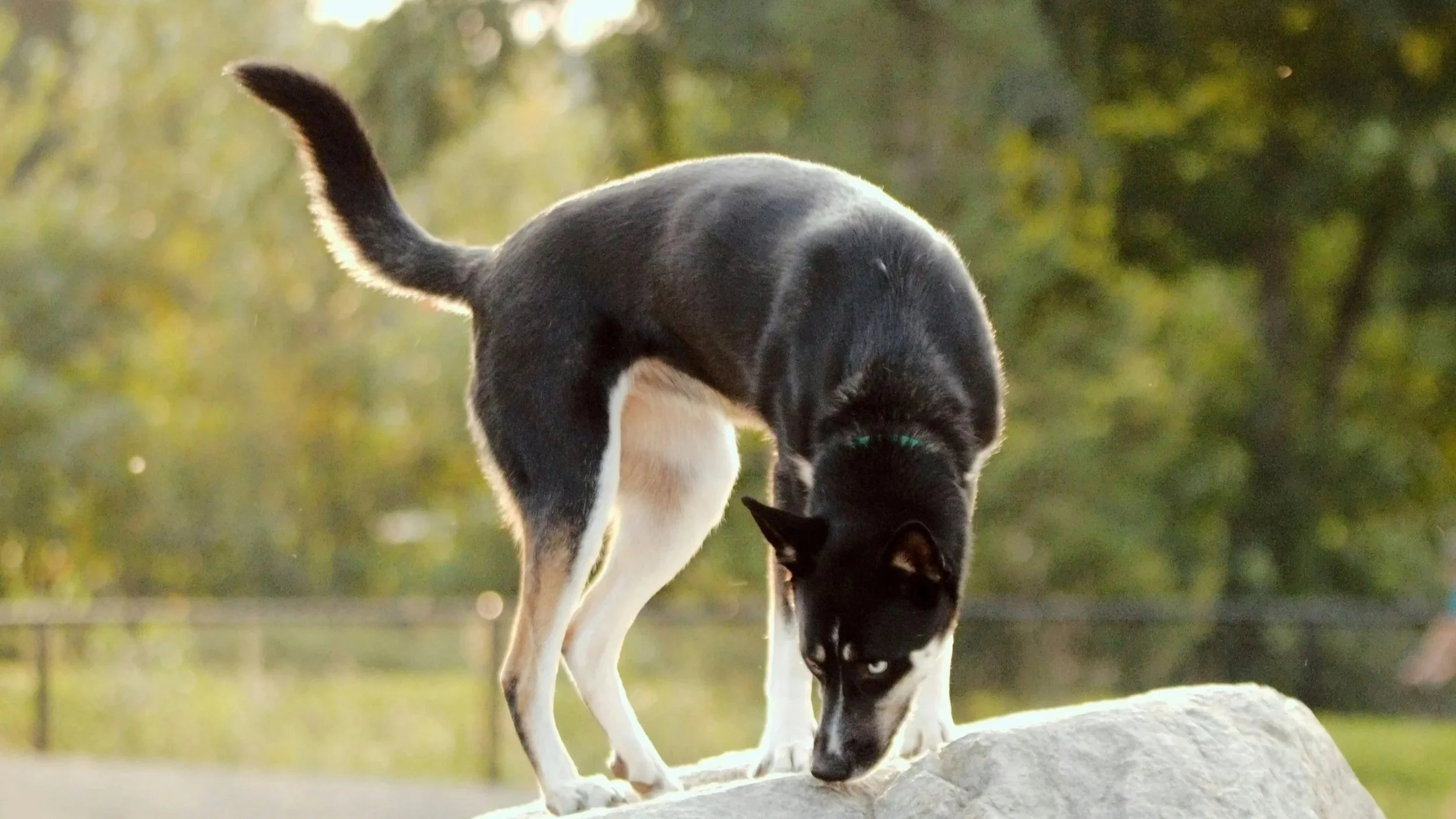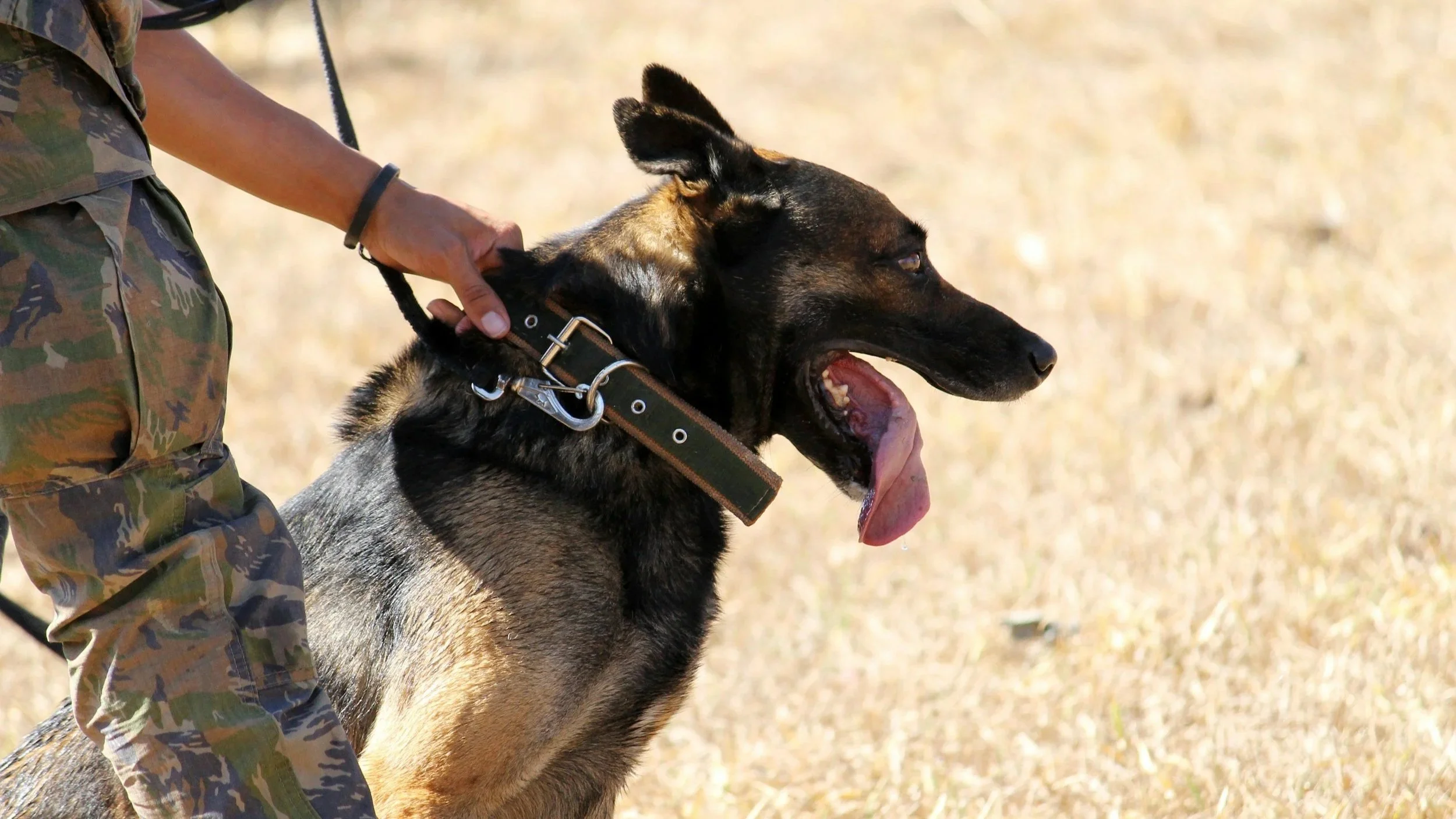
Welcome to Our Blog
Why “Balanced Training” Gets It Wrong: The Alpha Dog Myth and the Case for Positive Reinforcement
Do you see yourself as the “alpha” or pack leader that your dog must respect and obey? If so, you’re leaning on a concept that doesn’t actually exist in the wild—yet it’s still being used today to justify harsh, outdated dog training methods. Learn why force and intimidation are never necessary in dog training and how positive reinforcement builds trust, confidence, and more long-lasting results.
Board-and-Train vs. Private Lessons: What Actually Helps Most Dogs Learn
At some point, every dog parent hits the wall: you’ve tried YouTube tips, a pocketful of treats, and your firmest “no”—but the leash pulling, guest-jumping, or barking when you leave still happens. It’s frustrating, because you love your dog, and the gap between what you’re teaching and what they’re doing feels… wide.
So the question comes up: should you send your pup away for an intensive board-and-train program, or work with a trainer through private lessons where you learn alongside your dog?
Both can help. One may simply fit your dog, home, and schedule better than the other. Let’s break down how dogs actually learn, where each approach shines, and how to choose with confidence.
Why Do Dogs Wag Their Tails? (Hint: It’s Not Always Happiness!)
If you see your dog’s tail wagging, you might assume they’re overjoyed—but tails have a lot more to say than just “I’m happy!” From subtle signals of nervousness to bold statements of confidence, your dog’s tail is like their personal mood ring—and it’s constantly broadcasting to both humans and other dogs. Understanding what those wags really mean can help you communicate better, prevent misunderstandings, and even spot stress or excitement before it turns into problem behavior.
My Dog Bit Me When I Tried to Take Something Away
Ever been shocked when your sweet dog suddenly snarled, snapped, or even bit just because you tried to take something away? You’re not alone. Many loving pet parents experience the distress of resource guarding—a natural but challenging behavior that can turn daily life with your pup into a source of anxiety. In this post, we’ll explore why dogs guard things, how this behavior can impact your home, and most importantly, what you can do to move forward safely and confidently. If resource guarding is affecting your family, there is hope—and practical help is available.
The Transformative Power of Positive Reinforcement Dog Training
Confused by the myriad of dog training methods out there and wondering what's the best way to train your dog? Positive reinforcement has emerged as the gold standard in modern dog training—and for excellent reasons. This science-backed approach rewards desired behaviors rather than punishing mistakes, creating eager learners who genuinely want to cooperate. Unlike harsh correction methods that can damage trust and trigger anxiety, positive reinforcement builds lasting behavioral changes while strengthening your bond. Discover why professional trainers worldwide have embraced this humane, effective method and how you can use it to transform your relationship with your furry friend.
Play and Style: Combining Positive Training and Quality Accessories
Make dog training fun with positive reinforcement and play. Discover how stylish, durable collars, harnesses, and leads boost comfort, control, and results.
Grass-Eating Dogs: Separating Fact from Fiction and Understanding the Behavior
Discover the surprising reasons behind your dog's grass-eating habits. From natural curiosity and boredom to nutritional deficiencies and attention-seeking, learn why dogs munch on grass and what you can do to manage this behavior. Get the inside scoop on whether grass-eating is safe for your furry friend and find expert tips on training your dog to ditch the grass-munching habit for good.
Positive is NOT Permissive: How to Correct a Dog Using a Positive Approach to Dog Training
Positive Is NOT Permissive: How to Correct a Dog Using a Positive Approach
Positive dog training doesn’t mean letting your dog run wild—it means guiding them with calm, consistent corrections that build trust and reliability. By using humane interventions like the collar grab, putting a dog back on a leash, restarting the game, or walking them away from rewards, you can stop unwanted behaviors without fear or intimidation. Prevention tools, like leashing in high-temptation situations, help your dog avoid mistakes while learning what earns rewards. With this proactive approach, your dog learns that good choices bring good things, making them a well-mannered, confident companion.
Should You Let Your Puppy Cry It Out in the Crate?
Should You Let Your Puppy Cry It Out in the Crate?
No—at least, not always. A few minutes of mild whining can be normal as your puppy adjusts to crate training, but prolonged or panicked crying can lead to fear, crate aversion, or early separation anxiety. If your puppy settles within 5–10 minutes, it’s usually okay to give them space. If they escalate, show signs of distress (panting, trembling, escape attempts), or refuse food, step in with gentle reassurance. Use gradual, positive crate training to build confidence, pairing the crate with comfort, enrichment, and calm routines.
Puppy Crying in the Crate? Gentle Training Tips That Actually Work
Wondering how long until your puppy stops crying in the crate—or whether something’s wrong? If your puppy cries, whines, howls, or barks nonstop when crated or left alone, they could be showing early signs of puppy separation anxiety.
While some vocalizing is normal, especially on the first night of crate training, excessive crying that lasts for hours or happens every night may signal a deeper issue like separation anxiety.
In this post, you’ll learn how to tell the difference between normal crate adjustment and separation anxiety-driven behavior, how long to let your puppy cry it out in the crate, and when and how to intervene effectively.
We’ll also walk you through positive, gentle crate training techniques that help your puppy feel safe, calm, and confident—whether you’re in the next room or away for the day.
How to Identify Dog Separation Anxiety — and How to Rule It Out
Separation Anxiety in Dogs: Signs, Triggers, and Early Solutions
Dog separation anxiety is a common, serious behavior issue that occurs when a dog panics the moment they’re left alone or confined away from their person. Typical triggers include:
• Being crated or baby-gated
• Staying home alone while you work
• Unfamiliar settings like daycare or boarding
Watch for these separation-anxiety symptoms:
• Refusing food or water when alone
• Continuous barking, howling, or whining
• Destructive chewing or scratching at doors and windows
• Escape attempts or self-injury
• House-soiling despite being potty-trained
Separation anxiety in dogs rarely improves without targeted help and often escalates over time. The good news: early intervention with proven, positive training—gradual alone-time desensitization, enrichment routines, and, when needed, vet-guided medication—can restore calm and confidence. By recognizing dog separation anxiety quickly and treating it with science-based methods, you’ll protect your dog’s well-being and regain peace of mind every time you leave home.
Keeping the Peace: Noise-Reducing Tips for Dog Owners Living With Roommates
Sharing your space with both a dog and a roommate can be incredibly rewarding, but also challenging when it comes to managing noise. Dogs bark, play, and sometimes whine, which can be frustrating for others who don’t share your love for your furry companion. Whether your roommate is a fellow dog lover or just tolerating your pup, reducing noise is essential to maintaining a peaceful home.
Boosting Puppy Training Success: The Role of Nutritious, Real-Food Rewards
Training a puppy is one of the most rewarding and formative experiences for any dog owner. These early months are crucial for shaping your puppy’s behavior, social skills, and overall confidence. But let’s be honest, keeping a young pup engaged and cooperative isn’t always straightforward. That’s where training treats come in. The right reward can work wonders in reinforcing good behavior and creating positive associations with commands. But not all treats are created equal.
How to Do Dog-to-Dog Introductions: A Step-By-Step Guide for a Happier Pack
Bringing home a new dog can be one of the most rewarding experiences for your family and your resident pup alike. Not only do you expand your family, but you also offer your current dog extra companionship and playtime. Yet, as exciting as it is, it’s important to remember that building a strong canine relationship takes time and patience. Even if everything seems to start off smoothly, early dog-to-dog quarrels can happen easily and may set back their friendship. That’s why careful planning and a slow, steady approach are crucial.
Should I Bring My Dog to a Fourth of July Celebration?
The Fourth of July is one of the most anticipated celebrations of the year—complete with backyard barbecues, festive drinks, and of course, fireworks lighting up the night sky. But while this day is filled with fun for humans, it can be overwhelming—and even dangerous—for our canine companions.
Before deciding to bring your dog to a holiday gathering, it’s important to consider their comfort, safety, and overall well-being. Here's what to think about before taking your furry friend to the party.
Understanding Dog Selectiveness: Why Some Dogs Are Picky About Their Canine Companions
Understanding why some dogs are selective about their canine companions is essential for fostering positive interactions. Factors like genetics, early socialization, and past experiences all play a role in shaping a dog's social behavior. Different play styles, size, and breed can influence compatibility, while age and past trauma may increase selectiveness. Recognizing and respecting these preferences helps ensure that our canine friends feel secure and content in their social interactions. Embracing a dog's unique personality can lead to more harmonious and enjoyable experiences.
Priority Access Behavior in Dogs: What It Is and Why It Matters
Have you ever noticed your dog pushing their way to the front of the pack to be petted first, or racing to get the best spot on the couch—especially when another dog or person is around? That drive to always be "first in line" may not be a coincidence. It could be what I call Priority Access Behavior—a pattern of competitive behavior that’s important to recognize and address for harmony in multi-dog households.
How to Manage a Multi-Dog Household: Tips for a Harmonious Home
Managing a multi-dog household requires careful planning, consistent training, and attention to individual needs. With the right approach, you can create a harmonious environment where all your dogs thrive.
Sore Throat in Dogs: Causes, Symptoms, and Treatment
A sore throat in dogs can be tricky to detect. If your dog is coughing, gagging, or their bark sounds different, they may have an irritated or inflamed throat. While mild inflammation is usually not a major concern, it can sometimes signal a more serious underlying condition. Fortunately, there are both veterinary treatments and holistic home remedies to help your pup r
Will My Dog Bite Again? How to Assess the Risk After a Dog Bite
If your dog bit you or someone else, you may be wondering if they will bite again.
After your dog bites someone, it can make you think twice about whether or not it’s a good idea to keep them as a pet.
Here are the four key areas that can help you assess the danger of your dog’s future behavior and whether they can safely stay in your home or not.




















